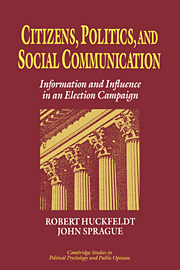Book contents
- Frontmatter
- Contents
- Acknowledgments
- I Democratic politics and social communication
- II Electoral dynamics and social communication
- III Networks, political discussants, and social communication
- 6 Political discussion in an election campaign
- 7 Networks in context: The social flow of political information
- 8 Choice, social structure, and the informational coercion of minorities
- 9 Discussant effects on vote choice: Intimacy, structure, and interdependence
- 10 Gender effects on political discussion: The political networks of men and women
- IV The organizational locus of social communication
- Bibliography
- Index
6 - Political discussion in an election campaign
Published online by Cambridge University Press: 22 March 2010
- Frontmatter
- Contents
- Acknowledgments
- I Democratic politics and social communication
- II Electoral dynamics and social communication
- III Networks, political discussants, and social communication
- 6 Political discussion in an election campaign
- 7 Networks in context: The social flow of political information
- 8 Choice, social structure, and the informational coercion of minorities
- 9 Discussant effects on vote choice: Intimacy, structure, and interdependence
- 10 Gender effects on political discussion: The political networks of men and women
- IV The organizational locus of social communication
- Bibliography
- Index
Summary
This chapter begins an examination of political information networks during the course of a presidential election campaign. Our immediate goal is to address a series of descriptive issues regarding the nature of social interaction among citizens – particularly social interaction that carries political content. With whom do citizens discuss the election campaign? How does political discussion vary across different types of relationships? To what extent does political discussion take place within networks of socially and politically homogeneous individuals? A sample of South Bend area residents was interviewed three times during the election campaign, and they were asked to name the people with whom they discussed the election, as well as to supply information regarding these relationships. A sample of these discussants was interviewed subsequently, thereby expanding our ability to examine the political content of social interaction.
National surveys of political behavior are characterized by a methodological vice nearly inherent in their basic design. The power of randomly sampling individuals, which so effectively controls many sources of unknown error and allows generalization to the population of adult citizens, is not typically designed to take account of the social environments where respondents are found. The citizen is plucked from a distinctive social and political setting for reasons that are, at least in the abstract, compelling on both methodological and scientific grounds. But inevitably, if unintentionally, such a sampling design creates a profound bias in the analyses and questions that might be addressed.
- Type
- Chapter
- Information
- Citizens, Politics and Social CommunicationInformation and Influence in an Election Campaign, pp. 103 - 123Publisher: Cambridge University PressPrint publication year: 1995



